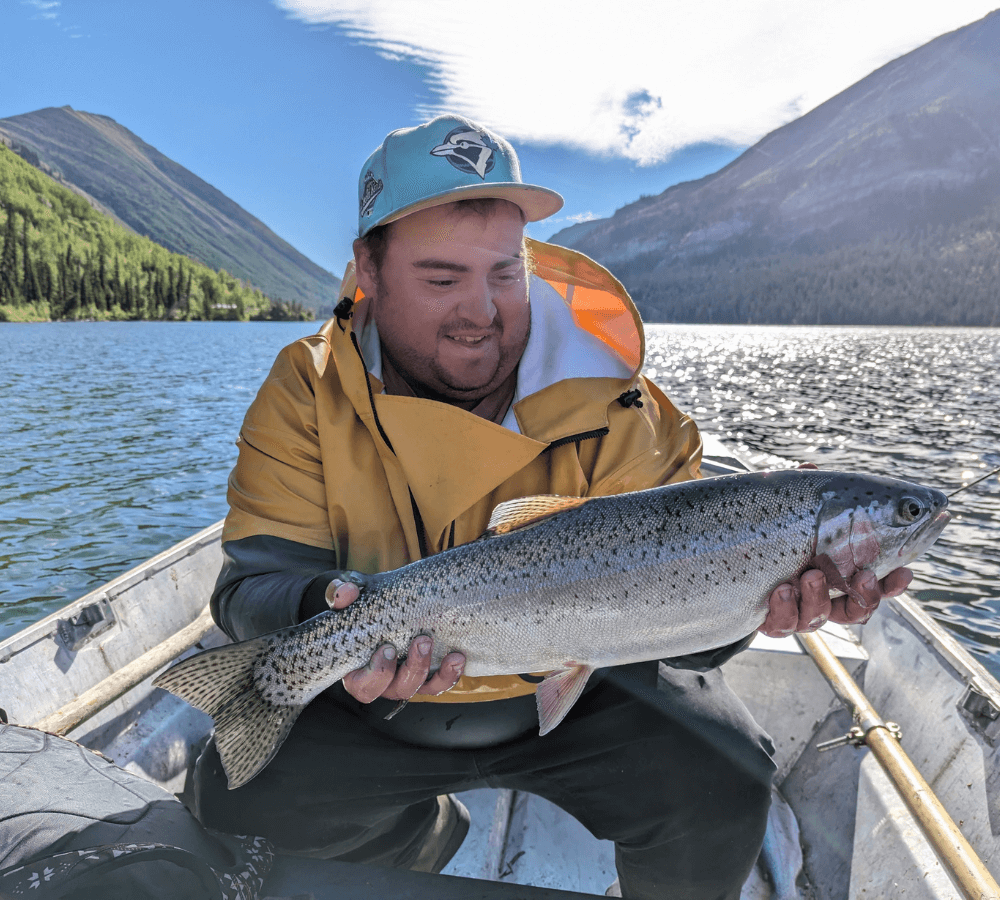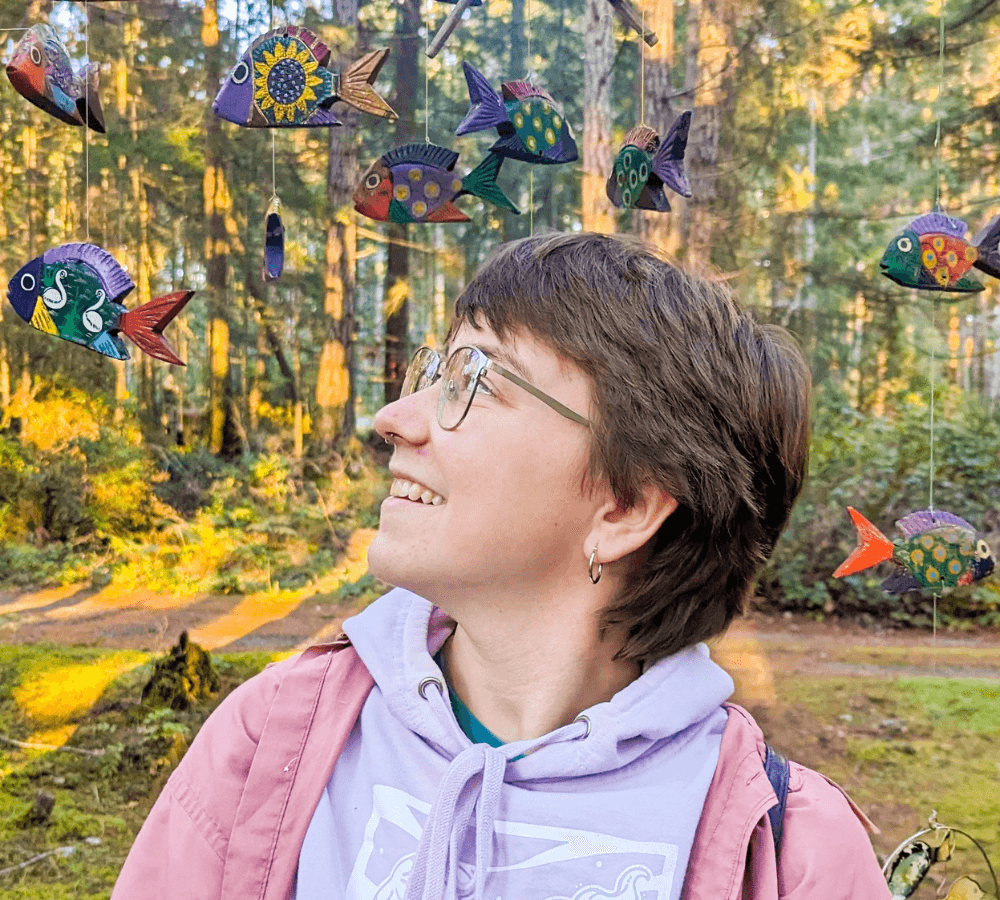Nick Davenport and Allie Unger share their stories
The Pacific Salmon Foundation oversees multiple scholarship awards and bursaries to help foster the development of emerging salmon leaders and scientists. Every year, these initiatives provide financial support to post-secondary students engaged in salmon-related studies.
Two outstanding students in the Fisheries and Aquaculture Diploma Program at Vancouver Island University were recently offered PSF-supported scholarships. Nick Davenport and Allie Unger accepted a $2,000 and $1,000 award respectively at a ceremony hosted by VIU in April 2024.
Meet the recipients below and learn more about their accomplishments.
Nick Davenport

The Dr. Brian Riddell PSF Fisheries Endowment Fund, established at VIU in 2018, honours the retirement of PSF’s former CEO. Dr. Riddell, who served at Fisheries and Oceans Canada (DFO) for 30 years before leading PSF for a decade. This scholarship is granted annually to an upper-level student specializing in wild salmon conservation and management at VIU.
Nick Davenport, a second-year student in the Fisheries and Aquaculture diploma program, is the 2023 recipient. Davenport grew up in Fort St. John and often spent time outdoors fishing, climbing and camping across the province with his family.
What sparked your initial interest in salmon conservation?
Growing up, my family came down to Vancouver Island every year to go fishing, and throughout my lifetime, the numbers have dwindled. I want to be able to continue fishing with my children as it is a core memory of mine.
Outside of your studies, how do you engage with salmon stewardship issues?
I volunteer at the Nanaimo River Hatchery. I have done broodstock collection of Pacific salmon, fin clipping and other tasks like feeding, ponding and egg picking.
What are some of the most pressing issues facing wild salmon populations today, and how do you hope to contribute to their conservation?
Some of the greatest issues I see with salmon conservation are in the early life stages when the salmon are in freshwater habitats. I hope to work on stream rehabilitation and help repair habitat degradation from industry.
Are there any specific research projects or initiatives you’re particularly passionate about within the realm of salmon conservation and management?
There is a research project hopefully being deployed in northeast BC to study a chum salmon population that runs up the Liard River system. They are in limited numbers and at this time there has not been a study done since the late 1970s! Another project I would like to get involved with is the hybridization of Chinook and coho salmon in the Cowichan River.
Can you share some of your future career goals or ambitions?
My plan is to work in research. Some provinces hire biologists to do research, or I could join a consulting firm that prioritizes fish and habitat work.
What does this scholarship mean to you?
The scholarship has allowed me to put all my effort into school and learning. It’s meant that I could be completely involved with my program and other students as well.
Allie Unger
Alexander “Sandy” Miller was in the post-degree studies program in Fisheries and Aquaculture at VIU when he passed away in 2017. With generous donations to PSF in Sandy’s memory, together with funding from his family, and the Vancouver Island University Foundation, PSF created the Alexander “Sandy” Miller PSF Fisheries Endowment Award.
This annual award recognizes Sandy’s passion for wildlife and environmental protection, his concern for wild Pacific salmon, his appreciation of wild salmon’s significance to West Coast Indigenous culture and his kind-heartedness towards others.
Allie Unger received the 2023 memorial award. Like Davenport, Unger is also a top fisheries and aquaculture diploma student at VIU with a keen interest in wild salmon conservation. She enjoys painting and birdwatching in her spare time.
According to his family, “Sandy would want us to congratulate Allie for this well-deserved recognition and thank her for her hard work and commitment to salmon. Sandy would be honoured to be part of PSF’s support of students in the context of PSF’s critical salmon conservation work.”
What sparked your initial interest in salmon conservation?
During my studies, I’ve had countless significant encounters with salmon: learning their life histories in class, participating in snorkel surveys, spotting juveniles in local rivers, fishing with friends and sampling catch as a recreational fishery observer. Salmon are the bridge between freshwater and the ocean, and they are a living reminder of how these two worlds are connected, although we might perceive them as being separate.
Outside of your studies, how do you engage with salmon stewardship issues?
Community events are one of my favourite ways to get involved. Last summer, I got to attend a Nuu-chah-nulth totem pole raising. As part of the festivities, a dancer performed a salmon dance to welcome and celebrate the returning salmon, which really resonated with me. The salmon dance was a meaningful way to acknowledge salmon’s seasonal rhythms through creative expression.
In your opinion, what are some of the most pressing issues facing wild salmon populations today, and how do you hope to contribute to their conservation?
Salmon conservation is dependent on access to healthy spawning habitat in streams and rivers. Areas surrounding watersheds are often heavily developed for housing, industry and agriculture, which threatens riparian zones and plant communities that protect and sustain salmon-bearing streams. Fortunately, a lot can be done to help remedy these issues, such as restoration of riparian zones and construction of channels to bypass barriers.
Are there any specific research projects or initiatives you’re particularly passionate about within the realm of salmon conservation and management?
The Carnation Creek project has assessed the long-term impact of logging in the 1970s. I think this project is fascinating and significant because it shows the value of monitoring trends over a long period of time.
Can you share some of your future career goals or ambitions?
After graduating from the Fisheries & Aquaculture program, I will be focused on gaining experience in the aquatic science field as a technician. Any day that I can work with fish, plankton, algae or invertebrates is a good one! However, further down the road, I am interested in what lies at the intersection of my interests in art and science. Ultimately, I hope to live a life of curiosity, creativity and observation.
How did you learn about PSF and what does this scholarship mean to you?
PSF is a big player in salmon conversations on this coast, so naturally it has come up many times during my diploma. I am deeply grateful for the financial support of my education and the honour of being included in Sandy’s legacy.

To learn more about scholarship opportunities at VIU, please contact Duane Barker: Duane.Barker@viu.ca.
Related Posts
Got an article idea for the blog? Email students@viu.ca.




